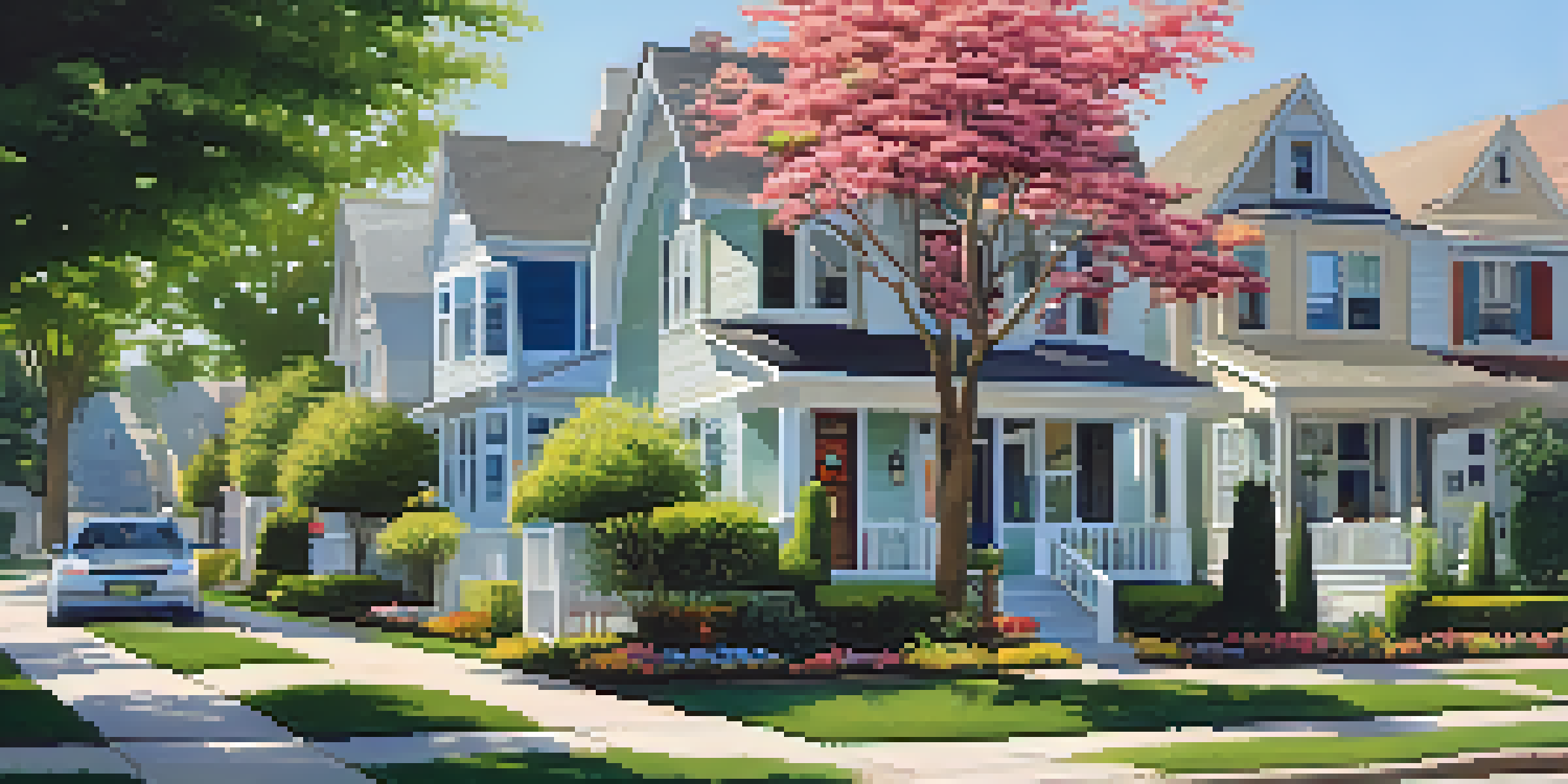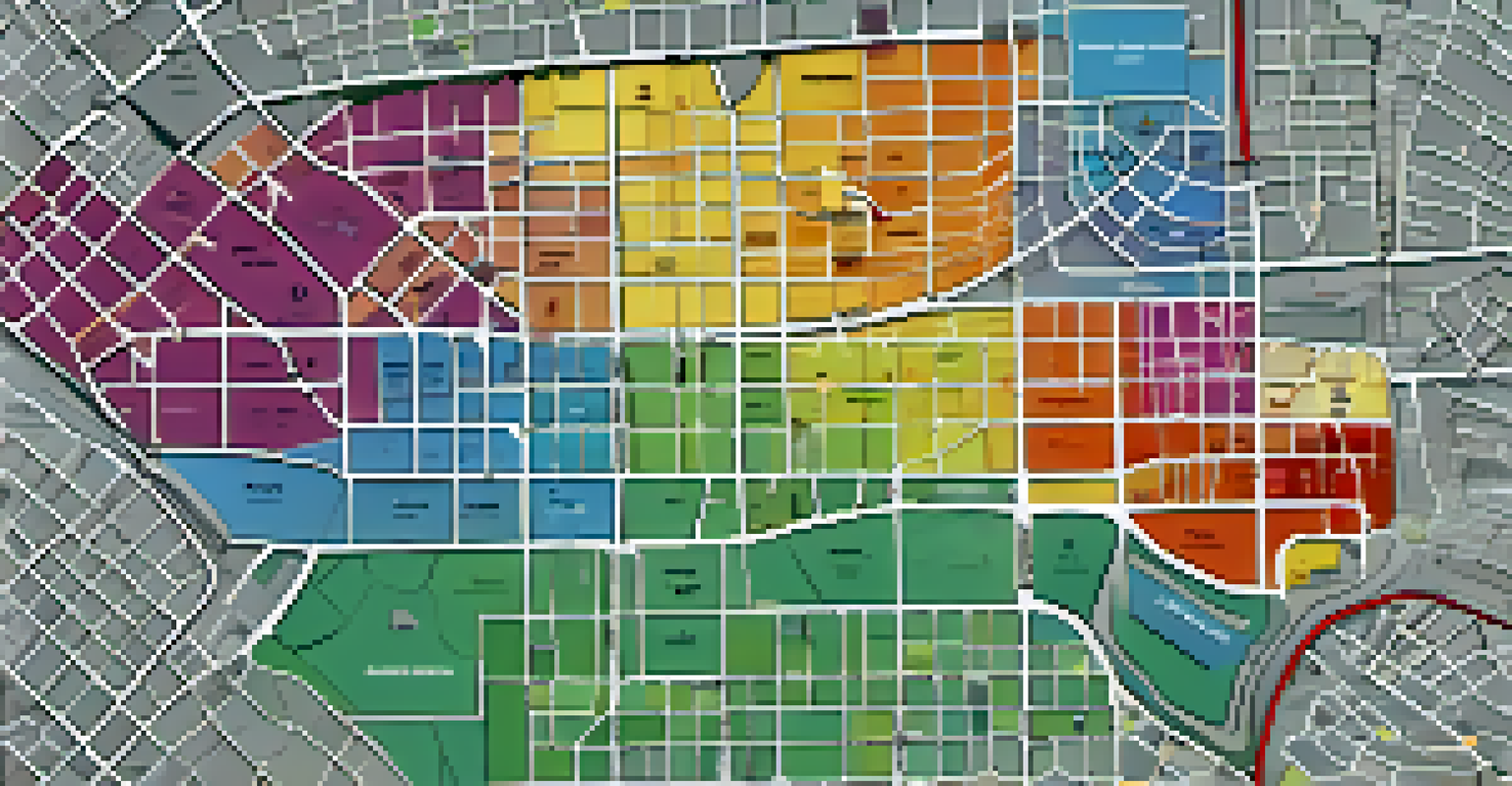The Impact of Zoning Laws on Property Value

Understanding Zoning Laws and Their Purpose
Zoning laws are regulations set by local governments that dictate how land can be used. These laws help organize urban development, ensuring that residential, commercial, and industrial areas are clearly defined. By establishing zones, municipalities aim to create a structured environment that promotes public welfare, safety, and convenience.
Zoning is not just a matter of land use; it’s about the quality of life we want to create for our communities.
For example, a residential zone may prohibit factories to maintain a peaceful neighborhood atmosphere. This zoning structure can protect property values by preventing incompatible land uses from encroaching on residential areas. Understanding these laws is crucial for homeowners and investors alike, as they play a significant role in determining property values.
Ultimately, zoning laws help create a blueprint for community growth, influencing everything from traffic patterns to the types of businesses allowed in an area. Their impact on property values is profound, making it essential for anyone involved in real estate to be aware of local zoning regulations.
How Zoning Affects Residential Property Values
Residential zoning laws directly impact property values by controlling what can be built in a neighborhood. For instance, if a community is strictly zoned for single-family homes, the demand for these properties may rise, increasing their value. Conversely, if a neighborhood suddenly allows multi-family units, it could lead to an oversupply, potentially decreasing individual property values.

Moreover, zoning can shape the desirability of a neighborhood. Areas with strict zoning laws often maintain a certain aesthetic and quality of life, attracting buyers willing to pay a premium. On the other hand, areas with lax zoning may see a decline in property values due to increased noise, traffic, and a change in the neighborhood's character.
Zoning Laws Shape Property Values
Zoning regulations dictate land use, impacting property values by maintaining neighborhood character and defining development types.
In summary, residential zoning not only regulates building types but also plays a crucial role in shaping market perceptions and values. Homeowners should always consider zoning laws when evaluating the long-term value of their properties.
Commercial Zoning and Its Impact on Property Values
Commercial zoning laws designate areas for business activities and can significantly influence property values. A neighborhood that transitions from residential to commercial zoning often sees a surge in property prices due to increased foot traffic and business opportunities. This can make properties in those areas more appealing to investors and entrepreneurs.
The only thing that can create value in real estate is good zoning.
However, it's not always positive. If a commercial zone allows for large-scale developments or low-cost businesses, it could lead to overcrowding, which may negatively impact nearby residential property values. The balance between attracting businesses and maintaining community character is crucial for long-term value retention.
Understanding the nuances of commercial zoning is essential for business owners and real estate investors. Those who navigate these regulations wisely can capitalize on opportunities to enhance property values in the vicinity.
The Role of Zoning Variances in Property Value Changes
A zoning variance allows property owners to deviate from established zoning laws, which can significantly affect property values. For example, if a homeowner receives a variance to build a larger structure than typically allowed, it can enhance the property’s worth by maximizing its potential. This flexibility can attract buyers looking for unique opportunities.
However, the process for obtaining a variance can be complex and may not always be granted. If neighboring properties face similar challenges, it could lead to a perception of unfairness, potentially impacting overall property values in the area. When variances are granted, they often set precedents that could either enhance or diminish the value of surrounding properties.
Variances Offer Opportunities and Risks
Zoning variances allow property owners to exceed standard regulations, potentially enhancing value but also introducing market risks.
In essence, zoning variances can be a double-edged sword, offering opportunities while also posing risks. Property owners should carefully consider the implications before pursuing changes to zoning regulations.
The Effects of Zoning Changes on Market Stability
Changes to zoning laws can lead to significant shifts in market stability and property values. When a city announces a new zoning plan, it may lead to immediate reactions in the real estate market, creating uncertainty and speculation. This can be especially true in areas where zoning changes allow for increased density or new types of developments.
For instance, a city’s decision to rezone an area for mixed-use development can attract investors eager to capitalize on the new opportunities. However, it can also lead to concerns among current residents about potential overcrowding, which may cause fluctuations in property values. The key lies in how well the transition is managed and communicated to the public.
Ultimately, understanding the potential impacts of zoning changes on market stability is crucial for both buyers and sellers. Staying informed can help navigate these changes and make educated decisions in real estate transactions.
Zoning Laws and Environmental Considerations
Zoning laws often incorporate environmental considerations, impacting property values in various ways. Many municipalities establish zoning regulations to protect natural resources, such as wetlands or historic sites, which can enhance the appeal and value of nearby properties. These environmental protections can create a desirable atmosphere that attracts buyers who value sustainability.
On the flip side, stringent zoning laws aimed at preserving the environment can limit development opportunities, potentially stifling growth and affecting property values negatively. If developers are unable to build new homes or businesses due to environmental restrictions, it could lead to decreased supply and increased prices in other areas.
Zoning Changes Influence Market Stability
Alterations in zoning laws can lead to significant market fluctuations, affecting property values and creating uncertainty among buyers and sellers.
In summary, the relationship between zoning laws, environmental protection, and property values is complex. It requires a careful balance to ensure that both ecological concerns and economic growth can coexist.
The Future of Zoning Laws and Property Values
As urban areas continue to evolve, zoning laws are likely to adapt to meet new demands. The rise of remote work, for example, has led some cities to reconsider residential zoning to accommodate home offices and mixed-use developments. These changes can affect property values by creating more versatile living spaces that attract a broader range of buyers.
Technology also plays a role in shaping the future of zoning. Smart city initiatives and data-driven planning can lead to more informed zoning decisions that better reflect community needs. This could enhance property values by ensuring that developments align with residents' expectations and lifestyle changes.

Looking ahead, staying informed about potential zoning changes is essential for homeowners and investors. Understanding how these laws may evolve can provide valuable insights into future property value trends.